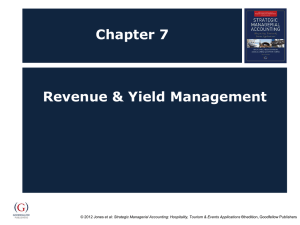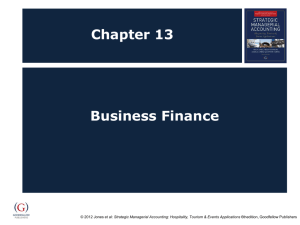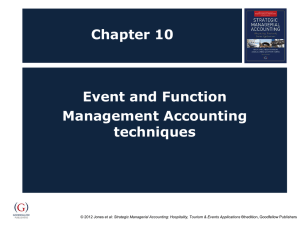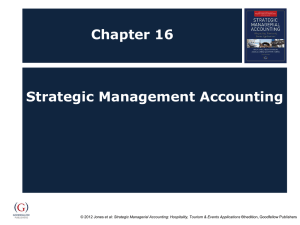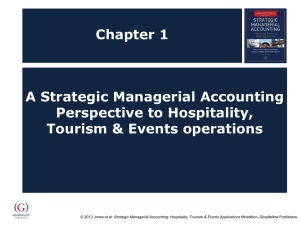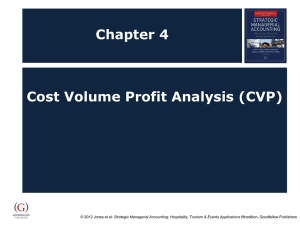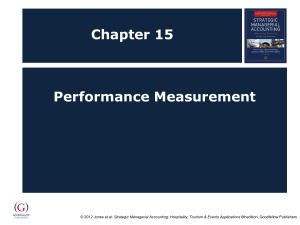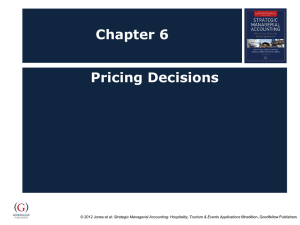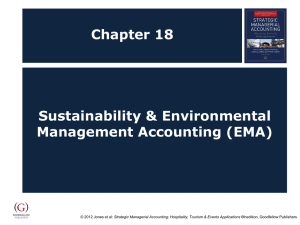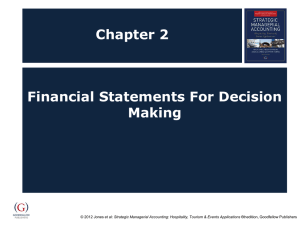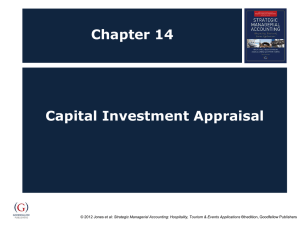Chapter 5 - Goodfellow Publishers
advertisement
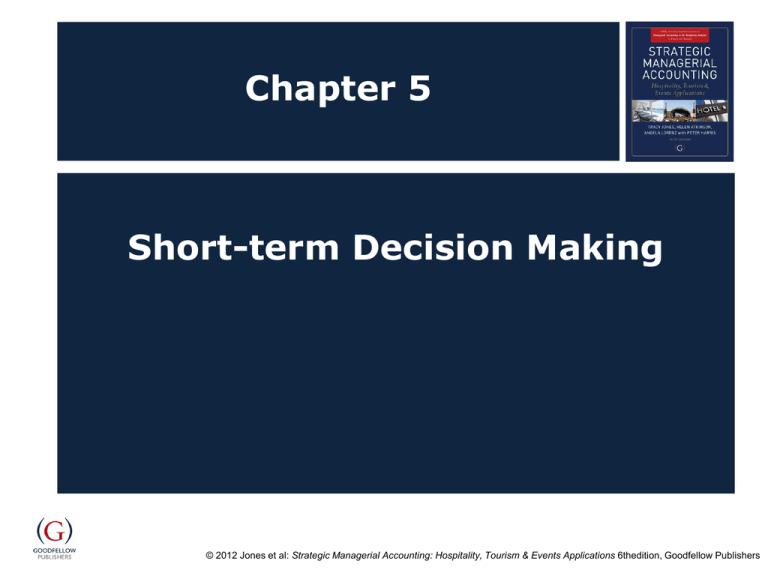
Chapter 5 Short-term Decision Making © 2012 Jones et al: Strategic Managerial Accounting: Hospitality, Tourism & Events Applications 6thedition, Goodfellow Publishers Objectives After studying this topic you will be able to: Understand costs that are relevant to the decision making process in different circumstances; Demonstrate working knowledge of typical short term decisions managers have to make and how financial data can support these decisions; Recognise the issues of managing scarce recourses in decision making; and Appreciate the implications of outsourcing in a business context. © 2012 Jones et al: Strategic Managerial Accounting: Hospitality, Tourism & Events Applications 6thedition, Goodfellow Publishers Relevant costs in decision making In short term decision making costs can be classified as to whether they are: Relevant or Irrelevant © 2012 Jones et al: Strategic Managerial Accounting: Hospitality, Tourism & Events Applications 6thedition, Goodfellow Publishers Events Example A venue has been hired for a commercial event to take place in 2 weeks’ time, unfortunately ticket sales have been very slow and it looks as though the event will be run at a loss. The manager of the events company needs to make the decision ‘should the event be cancelled or not?’ from a financial perspective he would need to look at the ‘relevant’ costs to see which costs would be ‘relevant’ to his decision. What would these be? © 2012 Jones et al: Strategic Managerial Accounting: Hospitality, Tourism & Events Applications 6thedition, Goodfellow Publishers Solution (1) Venue hirer costs Irrelevant – already paid in full, with a 100% charge if cancelled Printing tickets Irrelevant – tickets already printed and cannot be reused Performing artists fees Irrelevant – already paid in full, with a 100% charge if cancelled Permanent event company staff salaries Irrelevant – they still have to be paid even if this event doesn’t run Casual staff employed for the event Relevant – if the event is cancelled these will not have to be paid Food & Beverage material costs Relevant – the food hasn’t been ordered as yet, if the event is cancelled there is no F & B costs Merchandising costs Irrelevant – programmes and t-shirts already printed Event publicity costs, flyers & posters Irrelevant – already printed and distributed © 2012 Jones et al: Strategic Managerial Accounting: Hospitality, Tourism & Events Applications 6thedition, Goodfellow Publishers Solution (2) For this specific decision the balance is: Decision A – the event goes ahead – if it does there is some income, but all the ‘relevant’ costs will be incurred. Decision B – the event is cancelled – in this situation the ‘relevant’ costs would not be incurred, but refunds would need to be issued (another cost) and there would be no income. © 2012 Jones et al: Strategic Managerial Accounting: Hospitality, Tourism & Events Applications 6thedition, Goodfellow Publishers Opportunity costs The opportunity cost is the value of the ‘opportunity’ lost for the next best alternative in making a specific decision. © 2012 Jones et al: Strategic Managerial Accounting: Hospitality, Tourism & Events Applications 6thedition, Goodfellow Publishers Difference between short term and long term decisions? Short term decisions Long term decisions Operational, tactical in nature, meeting short term goals, or reacting to a crisis i.e. making the best of resources in the short term Each decision involves relatively small amounts of monetary value Relatively easy to change decision, withdraw from activity if the business environment changes Strategic in nature, impact on corporate level objectives and goals i.e. making the best of resources in the long term Each decision can involve large sums of monetary value Making wrong decisions can have a major financial impact on the firm © 2012 Jones et al: Strategic Managerial Accounting: Hospitality, Tourism & Events Applications 6thedition, Goodfellow Publishers Types of short term decisions Make or buy Cease operations Offer special packages Acceptance of one off contracts © 2012 Jones et al: Strategic Managerial Accounting: Hospitality, Tourism & Events Applications 6thedition, Goodfellow Publishers Example: make or buy decision © 2012 Jones et al: Strategic Managerial Accounting: Hospitality, Tourism & Events Applications 6thedition, Goodfellow Publishers Solution Island Resorts Hotel Bread Rolls Purchase price Variable material cost Variable labour Fixed costs avoided if not making Total relevant costs MAKE 30,000 BUY 30,000 $0.15 $1,800 $1,200 $1,300 $4,300 $4,500 © 2012 Jones et al: Strategic Managerial Accounting: Hospitality, Tourism & Events Applications 6thedition, Goodfellow Publishers Example: decision to cease tour destination Peace Yoga Retreats Revenue India £,000s 400 Variable transport costs 80 Variable hospitality costs Fixed resort cost Fixed Head Office costs Total Costs Operating profit/loss by location Portugal £,000s 700 35 Turkey £,000s 500 75 200 420 225 30 40 35 100 410 100 595 100 435 -10 105 65 Totals Notes: £,000s An all-inclusive price covering plane, transfers, accommodation, full board, local representative and 1600 yoga teacher Includes plane and transfers per 190 person Includes resort accommodation and 845 meal costs Local representative & yoga 105 teacher Fixed HO costs shared by 3 300 locations 1440 160 © 2012 Jones et al: Strategic Managerial Accounting: Hospitality, Tourism & Events Applications 6thedition, Goodfellow Publishers Close the Indian operation Peace Yoga Retreats Portugal Turkey £,000s £,000s Totals Notes: £,000s Revenue Variable transport costs Variable hospitality costs 700 500 1200 35 75 110 420 225 645 Fixed resort cost Fixed Head Office costs Total Costs Operating profit by location 40 35 75 150 645 150 485 300 1130 55 15 An all-inclusive price covering plane, transfers, accommodation, full board, local representative and yoga teacher Includes plane and transfers per person Includes resort accommodation and meal costs Local representative & yoga teacher Fixed HO costs shared by 2 locations Profit is much lower without 70 operations in India © 2012 Jones et al: Strategic Managerial Accounting: Hospitality, Tourism & Events Applications 6thedition, Goodfellow Publishers Original data amended to only show the relevant costs for each location Peace Yoga Retreats Revenue Variable transport costs Variable hospitality costs Fixed resort cost Fixed Head Office costs Total Costs Operating profit by location India £,000s 400 80 Portuga l £,000s 700 35 Turke y £,000s 500 75 200 420 225 30 40 35 310 90 495 205 335 165 Totals Notes: £,000s An all-inclusive price covering plane, transfers, accommodation, full board, local representative and 1600 yoga teacher Includes plane and transfers per 190 person Includes resort accommodation and 845 meal costs Local representative & yoga 105 teacher 300 1440 Not a location operating cost All locations make a positive input 160 to company profits © 2012 Jones et al: Strategic Managerial Accounting: Hospitality, Tourism & Events Applications 6thedition, Goodfellow Publishers Additional Considerations The long term perspective Scarce resources Uncertainty Outsourcing © 2012 Jones et al: Strategic Managerial Accounting: Hospitality, Tourism & Events Applications 6thedition, Goodfellow Publishers Summary Relevant costs are those that are relevant to a specific decision being made. An opportunity cost is concerned with the ‘missed opportunity’ when deciding between mutually exclusive options. There are various types of short term decisions – each may have a slightly different focus or role within the organisation. Short term decisions can have long term implications for an organisation. Scarce resource can lead managers to focus on how to use them to maximise the return for the organisation. © 2012 Jones et al: Strategic Managerial Accounting: Hospitality, Tourism & Events Applications 6thedition, Goodfellow Publishers
